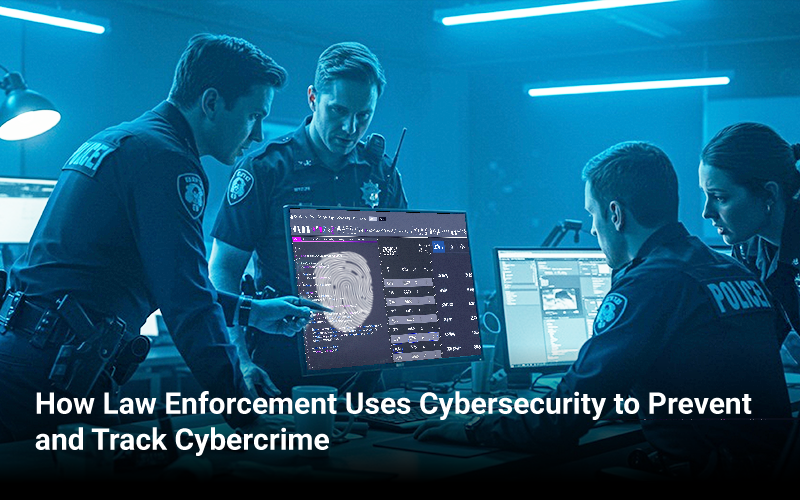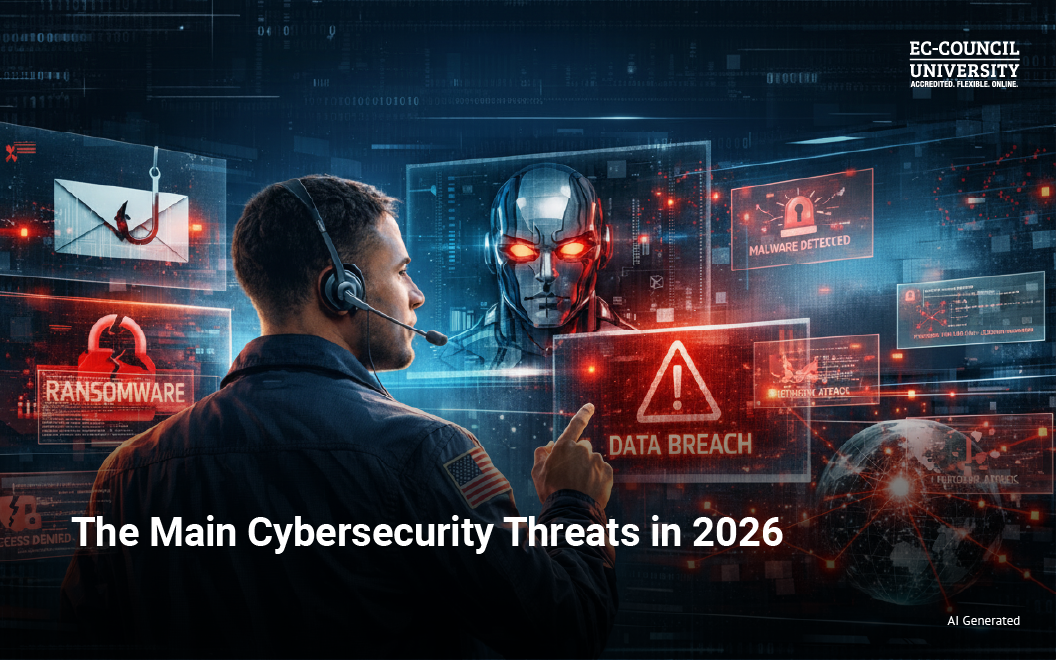Why an MBA in Cybersecurity Is Gaining Popularity Among Business Leaders
Today, pursuing an MBA degree is more important than ever for aspiring leaders. In the digital world, where cyber-attacks constantly threaten businesses, there is now a shift in the demand for business leaders who are expected to manage strategic business decisions while building a cyber-resilient organization. This has led to an increasing demand for specialized programs such as an MBA in Cybersecurity.
The traditional MBA has long been the gold standard for aspiring executives; however, the rise of technology-driven business environments and evolving cyber threats has driven the demand for an MBA in Cybersecurity. Both the MBA degrees prepare professionals for leadership roles, but their focus and outcomes differ significantly. Knowing the distinctions between an other MBA degree and a cybersecurity MBA is the key to deciding the right path that aligns best with your career goals
Understanding MBA specializations vs. Cybersecurity MBA: Exploring Your Options
What Does a usual MBA Offer?
An MBA degree is a program designed to prepare students with skills and provide a broad understanding of business, including finance, marketing, operations, leadership, and strategic management. MBA programs emphasize decision-making, communication, and analytical skills essential for leadership roles across industries, like Manufacturing, Finance, Healthcare, and Marketing.
Graduates of an MBA program assume roles like Management Consultants, Marketing Directors, Financial Analysts, or Business Development Managers. The primary goal is to build versatile leaders who can drive growth and efficiency within any business environment.
What Does an MBA in Cybersecurity Offer?
An MBA in Cybersecurity degree is a program that blends business strategy with core technical expertise to protect and build cyber-resilient organizations in the digital age. The specialized degree prepares leaders who can manage information security risks while maintaining business continuity. Students in a cybersecurity MBA program study business strategy, finance, marketing, operations, and the technical aspects of cyber risk management, information systems security, data governance, regulatory compliance, and digital forensics.
The program and the curriculum combination empower graduates to bridge the gap between IT teams and executive leadership. The MBA in cybersecurity specialization equips professionals with the skills to manage digital risks while leading businesses strategically. The students learn how to secure an organization’s digital assets and build cyber resilience by aligning cybersecurity strategies with broader business objectives.
With cyber threats becoming increasingly sophisticated, demand for professionals with both business acumen and cybersecurity knowledge is skyrocketing, making the MBA in Cybersecurity one of the most future-proof MBA programs available today.
Key Differences Between an MBA in Cybersecurity and a Traditional MBA
| Aspect | Traditional MBA | MBA in Cybersecurity |
|---|---|---|
| Curriculum Focus | Business strategies including Marketing, Operations, Finance, HR. | Business strategies and Cybersecurity management, which includes Risk Management, Analysis, Data Protection, Compliance and Governance, Marketing, Operations, Finance, HR. |
| Skills Developed | Leadership, project management, communication, and analytics. | Leadership, project management, communication, and analytics, cyber risk management, IT governance, compliance, and digital resilience. |
| Career Opportunities | Business management, consulting, marketing, operations, and general management. | Business management, IT operations, cyber risk management, IT project management, security consultant. |
| Industry Demand | Broad, across all sectors. | High demand in IT, finance, healthcare, defense, manufacturing and government sectors. |
| Salary Range | Competitive, varies by industry. | Often higher due to cybersecurity demand and skill scarcity. |
| Program Mode | On-campus and online options. | Increasingly available as online MBA programs for working professionals. |
While both paths offer strong leadership and management training, the MBA in Cybersecurity stands out for its relevance in a digital-first economy. Businesses now realize the direct impact of cyber risks on business profitability and operations. So, companies are now prioritizing cyber resilience alongside profitability, making cybersecurity leadership a vital executive skill.
Career Paths After a normal MBA or a Cybersecurity MBA
Top Careers You Can Pursue with an Master of Business Administration
Graduates from traditional MBA programs can pursue a wide range of careers, including:
- Management Consultant– Advising organizations on strategies to improve efficiency, growth, and performance.
- Financial Analyst– Guide in investment, budgeting, and business decisions based on financial data analysis.
- Marketing Manager– Develop and execute marketing strategies to build brand presence and drive sales.
- Business Development Executive– Identifying new market opportunities and building partnerships to expand business growth.
- Operations Director- Oversee daily operations and optimize processes for organizational effectiveness.
- Vice President– Driving strategic initiatives and managing business units to achieve corporate goals.
- Directors– Leading departmental strategy, performance, and cross-functional coordination to meet business objectives.
These roles typically focus on strategic decision-making, profitability, and growth within established business frameworks.
High-Demand Careers After a Cybersecurity MBA
An MBA in Cybersecurity opens the door to leadership positions that blend business oversight with digital defense. Typically, the high-demand job roles include:
- Chief Information Security Officer (CISO) – Lead enterprise-wide cybersecurity strategies.
- Cyber Risk Manager – Assess and mitigate cybersecurity risks in business and IT operations.
- IT Project Manager – Strategize and manage technology projects with an emphasis on secure design.
- Security Consultant – Advise firms on compliance and security architecture.
- Compliance Officer – Ensure organizations meet data protection laws and standards.
- Vice President – Steer organizational strategy and oversee business and cybersecurity initiatives to drive growth, cyber resilience, and digital trust.
- Director – Lead and align business strategy and goals with cybersecurity priorities for a secure, sustainable, and profitable business.
As organizations face increasing regulatory scrutiny and cyber threats, professionals with a cybersecurity MBA are becoming indispensable assets to both public and private sectors.
Which MBA Degree Fits Your Career?
Traditional MBA:
Ideal for those who want to explore a variety of business functions like finance, marketing, entrepreneurship, or operations. It is best suited for professionals seeking to transition into general management or start their own ventures.
MBA in Cybersecurity
The program is perfect for tech-oriented professionals, IT managers, or business leaders who want to specialize in the domain that intersects between business strategy and digital security. If you are passionate about safeguarding organizational data, mitigating risk, and driving secure digital transformation, this path offers a competitive edge.
In essence, while a traditional Master of Business Administration provides breadth, an MBA in Cybersecurity delivers depth, preparing you for C-Level Executive leadership in one of the most in-demand areas of business today.
Cybersecurity MBA vs Traditional MBA: Salary, ROI, and Job Market Insights
Both the MBA degrees offer strong returns on investment, but the market for cybersecurity leaders is expanding faster than most other business fields. According to industry reports, cybersecurity job openings are increasing at a rate of over 30% annually worldwide. The demand translates into higher salaries, job opportunities, and security for graduates with a cybersecurity MBA.
While graduates from a traditional MBA degree might earn impressive salaries in marketing, finance, consulting, or any other field, most cybersecurity professionals globally are commanding premium pay due to the shortage of qualified talent and the strategic importance of data protection in the current digital business era.
Moreover, many institutions and universities, such as EC-Council University, offer online MBA programs in cybersecurity, allowing professionals to upskill without leaving their current jobs. Such flexible online MBA programs make it easier than ever to access some of the best online MBA specializations worldwide. It is an increasingly popular choice among aspiring leaders for career growth and future-proof leadership.
The Future of Business Leadership in the Digital Era
An MBA in Cybersecurity is essential for current and future business leaders. In the age of digital transformation, business success and cybersecurity are dependent. Future executives must understand market dynamics and possess the instincts and expertise to anticipate and mitigate cyber risks that could jeopardize their business reputation and revenue.
An MBA in Cybersecurity equips tomorrow’s leaders with dual competency. It empowers professionals to design business strategies that are profitable and cyber-resilient. As technology continues to drive industries and shape the future, the demand for cybersecurity-savvy business leaders will only grow.
Choosing Between a Traditional MBA and a Cybersecurity MBA: Key Takeaways
Choosing between a traditional MBA and an MBA in Cybersecurity ultimately depends on your career goals. If you are passionate about general business management, a conventional Master of Business Administration remains a powerful credential for you. However, if you are interested in business leadership and digital defense, then an MBA in Cybersecurity can provide specialized expertise to lead confidently in today’s high-risk, high-impact digital business environment.
Think of it as in a world where data is the new currency, and businesses are digitally driven, the leaders who can protect it will define the future of business. So, whether you opt for a traditional or cybersecurity MBA, ensure that you select the best online MBA program that fits your goals. Additionally, ensure that when choosing the right program, you earn your degree from an accredited, and reputed institution that is globally recognized, offering a strong return on investment.







